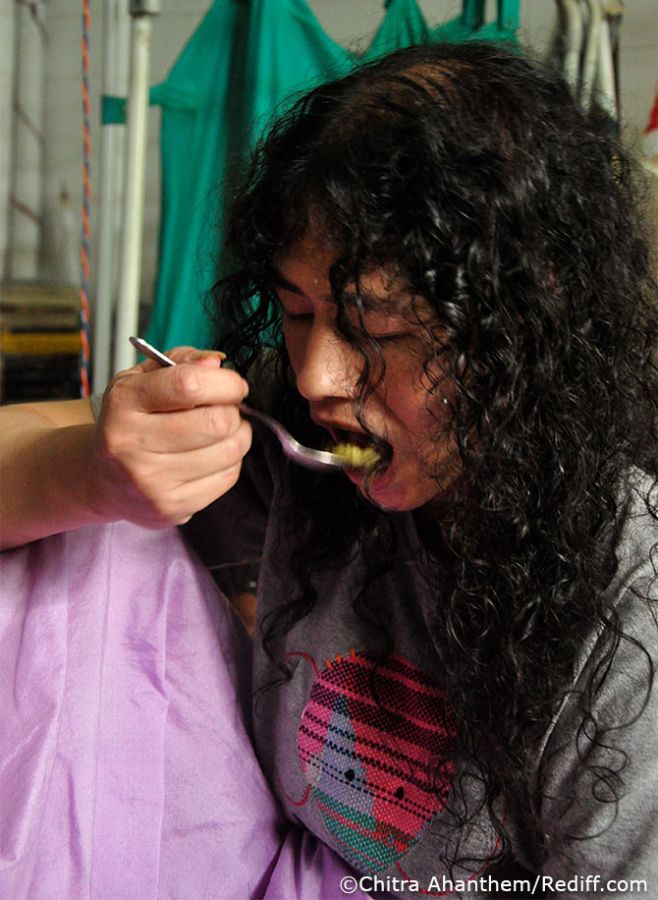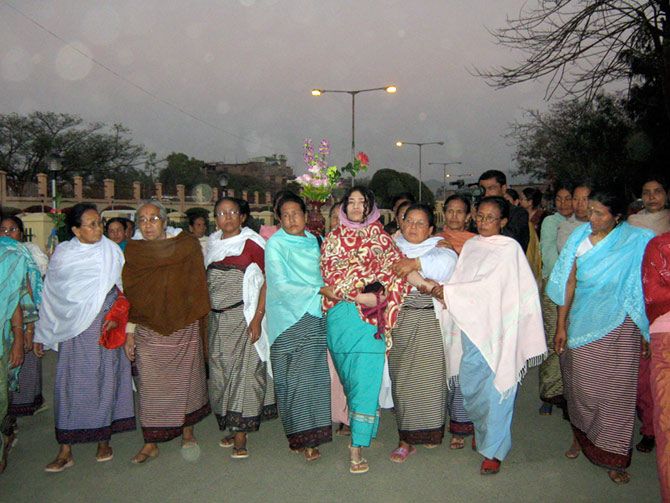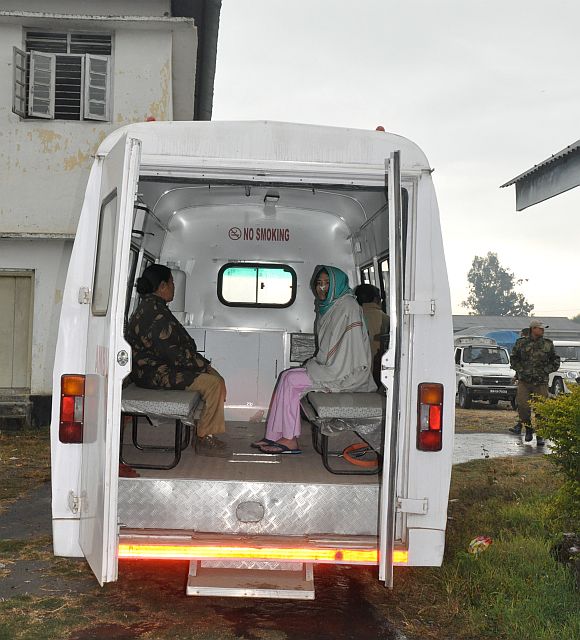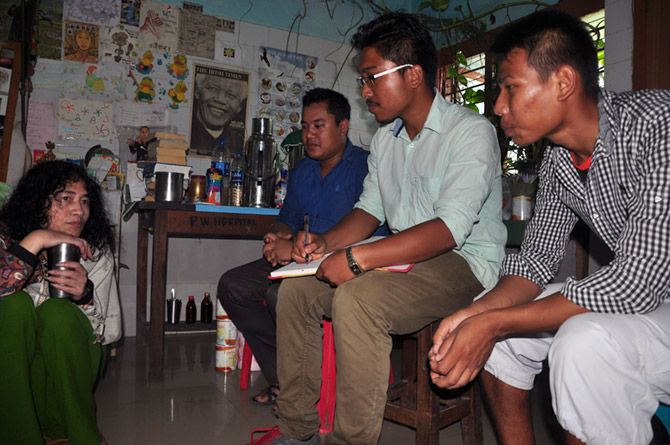 | « Back to article | Print this article |
'I will continue my fight against AFSPA, while seeking more interaction and engagement with the people of Manipur.'
'Those who agree with me can join me.'
'Those who do not agree with me, just release me.'
Iconic rights activist Irom Sharmila on the highs and lows of her long fast, why she gave it up and her future plans.

On August 9, Irom Chanu Sharmila broke her nearly 16-year-old fast demanding the lifting of the Armed Forces (Special Provisions) Act in Manipur.
In the days that followed, the 44-year-old iconic rights activist, who also writes poetry, spoke to Rediff.com contributor and journalist Chitra Ahanthem, in her room at the special ward of the government-run Jawaharlal Nehru Institute of Medical Sciences Hospital, Imphal.
They conversed in Manipuri, in between meetings with visitors, says Chitra "taking up from where we left (off)" after each interruption.
This is the hospital where Sharmila was first a prisoner and is now a patient. She has been shifted between to five different rooms at JNIMS during the intervening 16 years. Just prior to her fast Sharmila became vegan and does not even have milk.
Apart from fasting, there were several other symbolic acts she observed through these years. She didn’t look into a mirror and requested for the mirrors around her to be taken away. She would not comb her hair, except with her fingers at times. Or cut her nails.
Sharmila had stopped writing when she announced the end of her fast. But after her most recent court appearance August 23 she started to write again. While getting ready for this last appearance -- next is the argument phase run by her lawyers and only her presence is required -- she told Chitra she wanted to do a headstand and promptly went to the nurses’ station to do so, since her room had visitors.
Over the weekend the activist left the hospital and has moved to a yoga retreat center. When she has fully recovered she plans to travel around Manipur
In her interview to Rediff.com she spoke about the highs and lows of her long fast, why she gave it up and her plans.
What were the high points of your fast which began in November 2000?
(Smiles) During all these years, I have been grateful for the high points as they gave me the strength and inspiration to continue on my path.
The first: The Kangla protest by the 12 imas (mothers), the protests in Manipur and the media attention on Manipur led, soon after, to the handing back of Kangla to the people of Manipur by the then prime minister (Dr Manmohan Singh). That was very significant for the people of Manipur who had for long, been asking for the removal of the armed forces occupying our sacred space.
The second high point was a letter, written in barely discernible handwriting. It was dated October 2, 2009. I received it some time in November. I had no idea then that the person who wrote that letter would come to mean so much to me (smiles again).
I did not even know if the writer was a man or woman. But there was something deeply philosophical and hopeful about the letter that enveloped me with warmth.
What were the low points of your nearly 16-year-long fast?
When I read about the protest at Kangla (Manipur’s ancient capital in Imphal) by 12 of our imas following the brutal torture and death of Thangjam Manorama by personnel of the Assam Riffles, it deeply affected me.
The sight of their disrobed bodies standing against the might of the armed forces, who had till then been occupying Kangla, our symbol of political administration, sacred rites and rituals, moved me beyond words.
How could a democratic country reduce its women to being the prey of its soldiers, (so much so) that it led its women to dare them with their bodies?
How could they just pick up a woman (Thangjam Manorama) they alleged was the member of an armed outfit, in the dead of the night, and resort to their methods of torture?
How could they be judge and jury and deem Manorama as deserving of the fate they handed to her?
The Kangla protest shocked me and I felt immense respect for the 12 imas.

What do you feel about the Manipuri people's expectations and how they did not want you to break your fast? You have sort of become a victim of your own image, because you are considered the face of the protest?
When I started my fast, in 2000, it was my sole decision. I had not even informed even my mother (Shakhi Devi). I just told her I needed to get her blessings for something important I wanted to do.
The expectations that a section of the (Manipuri) public has -- that I should continue my fast -- is flawed. They made me the only face of the fight against AFSPA.
They put me on a pedestal.
Made me an icon.
They forgot that I was human. That I had expectations.
All these years I waited for a mass movement, where people would join me in the fight against AFSPA. I did get solidarity messages and public (acknowledgement) every time I was released on an annual basis. but the momentum was not there. The solidarity was not enough.
The iconhood was thrust on me. It was never of my own making.
The decision to break my fast was partly influenced by my discomfort and discontent over this mantle that had been put on me.
I am human and have every right to take my own decisions. That's exactly what I have done
What did you miss most during your fast?
(Thinks for a while and then her eyes light up, a smile breaks out on her face) I missed my long solo cycle rides. I would go to the outskirts of Imphal, beyond the urban clutter. The sight of nature would enchant me. In fact, I often cycled to school, from the time I was 12 or 13 years old. Though at times I also walked with my siblings (she had nine) to school.
After I dropped out of school -- you see, I was really bad at studies (laughs) -- I knew I had to learn some skill to be self-reliant and not just depend on my mother. I ended up doing short-term courses in various fields... Be it journalism, tailoring, shorthand, speaking English; even an ayurvedic course. For all these courses I went on my own on my cycle.
I would attend public functions and discussions happening around Imphal, to learn and observe what was happening. I volunteered for various organisations.

What do your remember about the days leading up to your fast?
November 2, 2000, I cycled from my home to Ghari (a village in Patsoi tehsil, Imphal West, 9 km away) for a meeting. It was attended by representatives of various civil society groups and youth organisations and was about organising a peace rally, that was to be held on November 11.
I was assigned the responsibility of meeting with other volunteers who would take part in the rally. That was when I heard the news about the Malom incident, in which 10 civilians were gunned down in firing by the armed forces (On November 2, 2000, in Malom, Imphal, an Assam Rifles team was marching on Tiddim Road, which connects Imphal with Myanmar, when a bomb exploded in front of them. In return, according to eyewitness accounts, the paramilitary troopers killed 10 people who were standing at a bus stop).
It struck me then that all our cries for peace were going unheeded.
The next day a students group announced a public curfew to protest the Malom firing. On November 4 I went to Khwairambandh market (the main market in Imphal) on my cycle to see how things were turning out. I only saw security personnel milling around.
I then went and made a round of visits to meet various people to co-ordinate the rally.
Even as I was doing this, I realised that there was a need to look at an alternative way of protest. Taking a stand for peace was important but not the usual rallies and protests.
I went home and bought two packets of local-made buns for Rs 10.
I decided they would be my last meal.
No one at home knew about my decision. I took part in the household chores as I normally did every other day.
November 5 I was again on my bicycle. I visited everyone with whom I was associated in my capacity as an intern or volunteer. I did not tell any of them I was going on a fast.
Finally at the meeting to discuss the rally, I announced I would be taking on a fast to call for the repeal of AFSPA. The meeting ended that very moment.
I was told I would have to announce the fast publicly as it was for the cause of the (people of) Manipur.
I was also told to seek the blessings of my mother (Shakhi Devi).
I ended up cycling back to my house. Then I went to Tera (Imphal West), where it was suggested that Malom would be a suitable venue for starting my fast. I sat below the rented premises of an office-bearer of an organisation for which I volunteered. The owner got angry. There was no one sitting near me and I was left alone. That night, the wife of the office-bearer gave me shelter.
The next morning, I went back to that venue to continue my fast.
By then people nearby had heard about the fast. Hundreds of people turned up to look at me curiously. They sneered at me. And commented that I was delusional. Eventually I turned my back and faced the wall.
The police then took me from there. I was taken to jail, where they put me on a saline drip. Because I refused to be force fed, they inserted a nasal tube. But I was fighting them off. In the scuffle, my nose and mouth started to bleed.
One month later, two married women also took up a fast against AFSPA. I was soon told by the jail authorities, and others, that their families would suffer if they continued. I was told that if I asked them to stop their fasts, that would be (an exercise) in face-saving for them and give them a way to pull out of the fast.
What do you feel your fast has achieved?
There have been many protests in Manipur and elsewhere against the imposition of AFSPA.
When I undertook my fast it was just one more person who had joined in the stream of protests. I had no idea that I would end up becoming the face of the AFSPA protest. I did not seek that for myself.
I did feel that my fast could lead to something tangible on the ground. That was not to be. The only small achievement (in connection) with my fast was that AFSPA was lifted from the Imphal municipality areas.
It is me who ended up as the one who benefitted from the fast... The long years have broadened my horizons.
I have become more fearless about my principles and steadfast in my decisions. All the long years have led me to adopt this change in my strategy in my fight against AFSPA.
What do you feel is next for you and how will you go about it?
I continue to be supported by friends and well-wishers on my road to physical recovery, while young people and other liberal sections of Manipur have come to meet and engage with me on what can and must be done for Manipur. I was only associated with the protest against AFSPA. But there are issues of justice, corruption and inequality that I feel we must all take a stand against.
I have decided to connect with people in Manipur, cutting across any distinctions of communities and religion.
What kind of political role are you exactly seeking?
My next step is to take part in the realisation of the full and true meaning of the democratic process.
We all say democracy is: of the people, for the people and by the people. In Manipur, the election landscape is such that only money power brings in the votes. That means in accepting cash for a vote, everyone has lost the right to register any complaint with the very government they have voted in.
I will be contesting as an independent candidate (elections to Manipur legislative assembly are likely to be held in early 2017). If there are others willing to join me in contesting elections, we can even start the process of forming a political party.
My interactions with first-time voters, students and other liberal individuals give me hope that we may well be starting off something that can bring about a positive change in the political landscape of Manipur.
Let us see how many people are willing for the change.
What does the young Indian need to know about Manipur?
The young Indians need to know Manipur was a sovereign kingdom and had to become a part of India.
The discussion on whether the people of Manipur consider themselves as part of India -- or not -- is a grey area. People here and indeed in the entire Northeastern region, continue to be hounded by security forces in their own homes, while they face racial discrimination and intense alienation when they go outside.
But the fact of the matter is that we are included in the entity called India. This means every person in Manipur needs to be accorded the status of citizenship, (in the manner) it is accorded to everyone in the rest of the country.
India cannot continue to tag us with ‘India’ and then treat us lesser than it treats other Indians.
What does the young Indian need to know about AFSPA?
The Armed Forces Special Powers Act in Manipur and other Northeastern states, and indeed Jammu and Kashmir, gives total impunity to the central armed forces.
Under this act, anyone can be picked up, detained, interrogated (often with brutal torture), and executed extra-judicially. There is no accountability, no reasoning when the Act is imposed.
It has led to thousands being killed and their families coping with their loss without any semblance of justice. It has led to women being raped and sexually exploited, while the perpetrators go scot free.
I want every Indian, young and old to realise that the imposition of AFSPA is a mockery of the Indian Constitution that guarantees the right to life as a fundamental right.
What of your personal relationships, with your family, marriage and the future?
Over the years I was made the face of the protest against AFSPA. I ended up ceasing to be just a member of a family.
Also, the physical isolation I lived under, and the nature of life where everyone is busy with their own lives, meant that my family would only read about me.
More than this, I would say that all that has to be said about my family is already out there and I will not dwell on it further. For now, I want to focus on what lies ahead of me.
With regard to my personal life and marriage, I would like to keep them out of the public domain now. We will cross that bridge when we come to it (smiles).

While you were on your long fast what did you do to pass time?
I found ways to keep myself busy. I read newspapers, I wrote poems and I would walk up and down the corridor even in the middle of the night.
Later when I started receiving books, I would read them. And also do puzzles. I got a 1,000-piece puzzle and it took me nine days to set up the final picture.
I also did yoga asanas which I learnt from a poster much before I started my fast. I would water the plants in my room and outside the special ward where I was kept.
(Points to the money plant kept on the space for ventilation along ceiling of her room) See that plant there? I water them by standing on a plastic chair on the plastic table there. Once the chair gave way. I was left hanging on the ventilation ledge above. I had to find a foothold somehow and escaped unhurt. When I told the medical staff, they told the security people. They scolded me like a naughty child (laughs) and said I would make them lose their jobs!
Is there anything that you would like to add about your current situation and the stand you have taken?
I want to say: Change is possible when we believe that we can.
A change in a good governance of equality, justice and transparency is possible when and if we are willing to be a part of it. I have extended my hands to reach out to people who are willing to work towards the change they desire.
In the nearly 16 years of the journey that I was earlier on, I faced extreme pressure, brought on by the expectations of people. I have somehow found the strength to take this stand.
I will continue my fight against AFSPA, while seeking more interaction and engagement with the people of Manipur.
Those who agree with me can join me.
Those who do not agree with me, just release me.